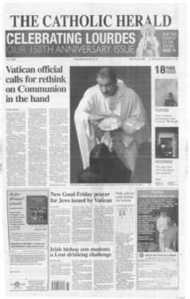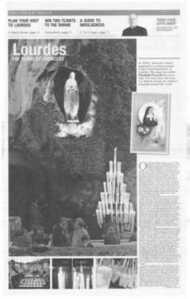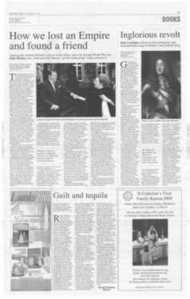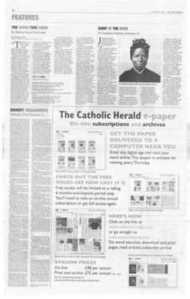Page 11, 8th February 2008
Page 11

Report an error
Noticed an error on this page?If you've noticed an error in this article please click here to report it.
Tags
Share
Related articles
I Had Thought That The Church No Longer Taught About
Pope Benedict Xvi: The Master-teacher
Pope Benedict Grants Indulgences For Jubilee Year...
Catechism Reform And The Leakage
Pope Tells Christians To Live In Hope Of The Last Judgment
Why modern Catholics need indulgences
Uwe understand correctly why the Church offers indulgences they can be a great aid to our spiritual lives, says Fr Tim Fin igan Some people have been surprised by Pope Benedict's recent decision to grant an indulgence related to the 150th anniversary of the apparitions of Our Lady to St Bernadette at Lourdes. Didn't indulgences go out with the Second Vatican Council? Many people have also heard that there was a scandal over the sale of indulgences and that this contributed to the Reformation. It is good for Catholics to understand something of the history of indulgences and to have a clear idea of what they are, how they can be obtained and why the Church considers them important.
In the early centuries of the Church the penance imposed for grave sins such as murder, adultery or apostasy was very heavy. A person would be a public penitent for a number of years; only after this penance had been completed was the penitent absolved and readmitted to Holy Communion. In some areas a penitent could go to those who were in prison awaiting martyrdom and obtain a "letter of peace" whereby the martyr-to-be would promise to pray for the penitent. The bishop might remit part of the penance in view of the prayers of these saints.
When the Celtic monks re-evangelised Europe after the fall of the Roman empire, it became common for some priests to be given faculties to absolve a penitent and to impose a penance. In the early middle ages it became common to allow a person's penance to be substituted by some other work such as almsgiving or a pilgrimage. This practice was a precursor to the formal granting of indulgences such as the jubilee indulgence for visiting Rome.
Indulgences for the giving of alms opened the way for abuses. Such almsgiving made possible the foundation of many hospitals but the "quaestors", promoters of indulgences, would sometimes effectively -sell" indulgences with little reference to the spiritual nature of almsgiving or the relationship of indulgences to the conversion of life. These abuses led Martin Luther to criticise indulgences and eventually to deny that the Church had the power to grant indulgences at all.
The Council of Trent affirmed that the Church has the power to grant indulgences. The same council abolished the office of quaestor and introduced strict rules regarding the handling of any alms. Shortly after the Council Pope St Pius V forbade the practice of giving an indulgence in respect of any Financial contribution, however praiseworthy. Another important reform of the Council was to ensure that only genuine indulgences were published. Eventually the Raccolta, an authentic collection of prayers, was published so that everyone could know exactly which indulgences they could gain.
In devotional books published before the 1960s many of the prayers are followed by such notes as "200 days' indulgence". This meant that the equivalent of 200 days of canonical penance was remitted by saying that prayer. In 1967 Pope Paul VI changed the way of evaluating indulgences and granted only two types of indulgence, partial and plenary. In his Apostolic Constitution Indulgentiaruni Doctrine he explained clearly what indulgences are and why they are important.
An indulgence is the remission before God of the temporal punishment due to our sins. A plenary indulgence gains the remission of all the punishment that is due; a partial indulgence gains the remission of some of the punishment. This reminds us that sin has real consequences for ourselves and for the whole world. By our prayers and works of charity, we change the world for the better. By sin. we change it for the worse. There is a communion of holy things across the whole Church; in heaven, in purgatory and on earth; the good of one person can assist others. We recognise this whenever we ask someone else to pray for us.
Pope Paul explained that the Church as "minister of redemption" has the power to dispense the "treasury of merits" the inexhaustible value of the redeeming sacrifice of Christ and the prayers and good works of Our Lady and the saints: this is what the Church is doing in granting an indulgence. He also said that the practice of gaining indulgences reminds us how bitter it is to have abandoned the Lord by our sins and how closely we are united to one another in Christ. He noted that indulgences encourage charity in us. especially when we apply them for the faithful departed.
There are some particular conditions that need to be observed in order to gain a plenary indulgence. As well as carrying out the prescribed work, we , must receive Holy Communion; we must receive the sacrament of penance within about a fortnight before or after; we must pray for the intentions of the Holy Father; and we must be free from all attachment to venial sin. This last condition has led some people to assert that it is almost impossible to gain a plenary indulgence. However, to be free from attachment to sin is not the same as saying that we will in fact never sin again. A genuine detestation of sin and a real determination not to sin is sufficient to fulfil this condition. Therefore it is possible for ordinary people to gain plenary indulgences in practice. It is a great act of charity to ask God to apply any indulgences that we gain to the Holy Souls. Often today funerals focus exclusively on the good that a person has done, as a celebration of their life. Well-meaning as this may be, it has the consequence that many of the Holy Souls may not have anyone praying for them. We can help to make good this lack by devoutly gaining all the indulgences that we can and offering them for the Holy Souls. The plenary indulgences that the Church grants encourage us in our spiritual life. We can gain a plenary indulgence daily by saying the rosary together as a family or group. or in front of the Blessed Sacrament, by making the Stations of the Cross, by taking part in Eucharistic Adoration for half an hour or by reading the scriptures for half an hour. Any of these practices would help one greatly in deepening one's spiritual life. Other indulgences are granted for particular occasions each year for renewing our baptismal promises at the Easter Vigil. venerating the Cross on Good Friday, participating devoutly in a first Communion Mass, or the first Mass of a newly ordained priest, for example.
Pope Benedict's Lourdes indulgence is obtained by making a pilgrimage to Lourdes and visiting various key places in Lourdes, or by offering some devout prayers before an image or statue of Our Lady of Lourdes. Many parish churches have put up a statue or picture of Our Lady, reminded people of the message of Lourdes and given some teaching on indulgences, praying for the Holy Souls and praying to Our Lady. If the Lourdes indulgence encourages people to visit Lourdes. to find out more about Our Lady's message, to go to confession, or to be stronger in overcoming sin, it will have brought about great good for the people of God.
blog comments powered by Disqus



















